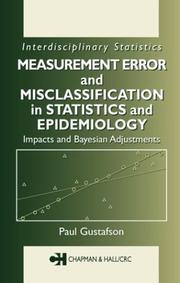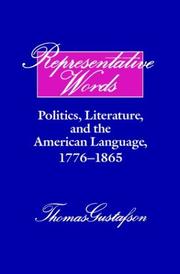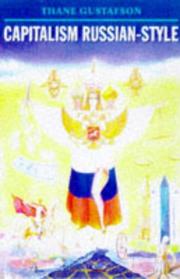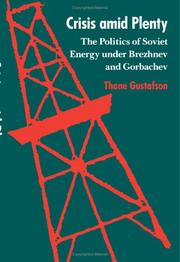| Listing 1 - 10 of 482 | << page >> |
Sort by
|

ISBN: 1584883359 Year: 2004 Publisher: Boca Raton Chapman and Hall
Abstract | Keywords | Export | Availability | Bookmark
 Loading...
Loading...Choose an application
- Reference Manager
- EndNote
- RefWorks (Direct export to RefWorks)
Mathematical statistics --- Bayesian statistical decision theory. --- Error analysis (Mathematics) --- Sequential analysis --- Statistical decision --- Errors, Theory of --- Instrumental variables (Statistics) --- Numerical analysis --- Statistics --- Bayes' solution --- Bayesian analysis --- Sequential analysis. --- Error analysis (Mathematics). --- Bayesian statistical decision theory --- Statistique mathématique --- Statistique mathématique --- Mathematical statistics. --- Analyse des donnees --- Epidemiology --- Mathematical methods

ISBN: 0521395127 052106564X 0511983743 Year: 1992 Publisher: Cambridge : Cambridge University Press,
Abstract | Keywords | Export | Availability | Bookmark
 Loading...
Loading...Choose an application
- Reference Manager
- EndNote
- RefWorks (Direct export to RefWorks)
Ralph Waldo Emerson's dictum - 'The corruption of man is followed by the corruption of language' - belongs to a long tradition of writing connecting political disorders and the corruption of language that stretches back in Western culture. Representative Words, which gives an account of the tradition from its classical and Christian origins through the Enlightenment, is primarily a study of how and why Americans renewed and developed it between the ages of the Revolutionary and the Civil Wars. It is the first comprehensive treatment of the background to and the appearance of the wealth of theories about language in the early era of American political and cultural discourse. Professor Gustafson's argument demonstrates the interconnectedness of the state of language and the state of society and turns on the question of representation and misrepresentation - whether and how words represent or misrepresent nature, social reality, truth, and value in the new American experiment in representative republican government.
American literature --- English language --- Political oratory --- Politicians --- Politics and literature --- Rhetoric --- Littérature américaine --- Anglais (Langue) --- Discours politique --- Hommes politiques --- Politique et littérature --- Rhétorique --- History and criticism --- Political aspects --- Language --- History --- Histoire et critique --- Aspect politique --- Langage --- Histoire --- History and criticism. --- Language. --- Littérature américaine --- Politique et littérature --- Rhétorique --- Arts and Humanities --- Literature --- Statesmen --- Language and languages --- Speaking --- Authorship --- Expression --- Literary style --- Germanic languages --- Anglais (langue) --- Langage politique --- 19e siècle --- États-Unis --- Thèmes, motifs --- 19e siècle --- Thèmes, motifs --- États-Unis
Book
ISBN: 9780674066472 0674066472 0674068017 9780674068018 0674070798 9780674070790 Year: 2012 Publisher: Cambridge, MA
Abstract | Keywords | Export | Availability | Bookmark
 Loading...
Loading...Choose an application
- Reference Manager
- EndNote
- RefWorks (Direct export to RefWorks)
The Russian oil industry-the world's largest producer and exporter, providing nearly 12 percent of the global supply-is facing mounting problems that could send shock waves through the Russian economy and worldwide. Wheel of Fortune provides an authoritative account of this vital industry from the last years of communism to its uncertain future. Tracking the interdependence among Russia's oil industry, politics, and economy, Thane Gustafson shows how the stakes extend beyond international energy security to include the potential threat of a destabilized Russia. Gustafson, a leading consultant and analyst of the politics of energy in the former Soviet Union, draws on interviews with key players over the course of two decades to provide a detailed history of the oil industry's evolution since the breakup of the Soviet Union. At its center is the complex and fraught relationship between the oil industry and the state, which loosened its grip under Yeltsin only to tighten it again under Putin. As oil becomes harder to find and more expensive to produce and deliver, Gustafson warns, Russia's growing dependence on revenue from oil exports, along with its inefficient and often-corrupt management of the industry, is unsustainable. A rich but troubled Soviet legacy, the conflicting ambitions of politicians and industry oligarchs, and the excesses of capitalism Russian-style threaten to lead Russia to an impasse. Involving the oil industry in the country's modernization agenda and remaking its relationship to the state, Gustafson argues, is Russia's best path toward a stable economy and a safer world.
Petroleum industry and trade --- Pétrole --- Political aspects --- Government policy --- Industrie et commerce --- Aspect politique --- Politique gouvernementale --- Petroleum industry and tradePolitical aspects --- Industry. --- Business & Economics --- Industries --- Pétrole --- Energy industries --- Oil industries --- E-books
Book
ISBN: 1885444222 Year: 2001 Publisher: MIT
Abstract | Keywords | Export | Availability | Bookmark
 Loading...
Loading...Choose an application
- Reference Manager
- EndNote
- RefWorks (Direct export to RefWorks)
circus --- Art, American --- Circus in art --- circus.
Book
ISBN: 014042329X 9780140423297 Year: 1984 Publisher: Harmondsworth Penguin books
Abstract | Keywords | Export | Availability | Bookmark
 Loading...
Loading...Choose an application
- Reference Manager
- EndNote
- RefWorks (Direct export to RefWorks)
Dissertation
ISBN: 9197410632 Year: 2002 Publisher: Göteborg Göteborg university. Department of sociology
Abstract | Keywords | Export | Availability | Bookmark
 Loading...
Loading...Choose an application
- Reference Manager
- EndNote
- RefWorks (Direct export to RefWorks)
Theses --- Human geography --- Environmental psychology --- Residential mobility --- Nationalism
Article
Abstract | Keywords | Export | Availability | Bookmark
 Loading...
Loading...Choose an application
- Reference Manager
- EndNote
- RefWorks (Direct export to RefWorks)

ISBN: 0521645956 0511016697 0521641756 1280420413 0511171900 0511149476 0511309686 051149212X 051105162X 1107116244 9780511016691 9780521641753 9780511492129 6610420416 9786610420414 9780521645959 9781107116245 9780511309687 9780511149474 9780511171901 9781280420412 9780511051623 Year: 2001 Publisher: Cambridge Cambridge University press
Abstract | Keywords | Export | Availability | Bookmark
 Loading...
Loading...Choose an application
- Reference Manager
- EndNote
- RefWorks (Direct export to RefWorks)
For a decade Russia has been dismantling communism and building capitalism. Describing a deeply flawed fledgling market economy, Capitalism Russian-Style provides a progress report on one of the most important economic experiments going on in the world today. It describes Russian achievements in building private banks and companies, stock exchanges, new laws and law courts. It analyzes the role of the mafia, the rise of new financial empires, entrepreneurs and business tycoons, and the shrinking Russian state. Thane Gustafson tells how the Soviet system was dismantled and the new market society was born. He argues that this new society is changing constantly, so that any assessment of success and failure would be premature. Identifying investment as vital to preserving Russia's status as a major industrial power, in his final chapter he examines the prospects for an economic miracle in Russia in the twenty-first century.
Capitalism --- -Post-communism --- -#SBIB:328H262 --- #SBIB:35H435 --- Postcommunism --- World politics --- Communism --- Market economy --- Economics --- Profit --- Capital --- Instellingen en beleid: Rusland en het GOS --- Beleidssectoren: economisch en werkgelegenheidsbeleid --- Russia (Federation) --- -Russia (Federation) --- -Economic conditions --- -Social conditions --- -Capitalism. --- Post-communism. --- Economic History --- Economic order --- Economic conditions. Economic development --- Russia --- Capitalism. --- Post-communism --- Economic conditions --- Social conditions --- Social Sciences --- Political Science --- #SBIB:328H262 --- Capitalism - Russia (Federation) --- Post-communism - Russia (Federation)
Book
ISBN: 3319761072 3319761080 Year: 2018 Publisher: Cham : Springer International Publishing : Imprint: Palgrave Macmillan,
Abstract | Keywords | Export | Availability | Bookmark
 Loading...
Loading...Choose an application
- Reference Manager
- EndNote
- RefWorks (Direct export to RefWorks)
This book brings together academic scholars from across various religious traditions to reflect on the beauty they find in traditions other than their own. They examine these aspects and reflect on how they inform and constructively assist with rethinking their own religious worldviews and practices. Each scholar investigates the various implications, questions, insights, and challenges that are generated in the process of doing so. Traditions discussed include Ásatrú Heathenism, Buddhism, Catholicism, Evangelical Christianity, Hinduism, Islam, Judaism, LDS Mormon Christianity, Lutheranism, Presbyterianism, Sikhism, Sufism, Western Buddhism, and Zen Mahāyāna Buddhism. Instead of focusing only or primarily on the theory and practice of interreligious dialogue, this book presents living examples of learning from other religious traditions, identities, and persons. .
Religion. --- Religions. --- Religion --- Religion and sociology. --- Religious Studies. --- Comparative Religion. --- Philosophy of Religion. --- Sociology of Religion. --- Religion and society --- Religious sociology --- Society and religion --- Sociology, Religious --- Sociology and religion --- Sociology of religion --- Sociology --- Comparative religion --- Denominations, Religious --- Religion, Comparative --- Religions, Comparative --- Religious denominations --- World religions --- Civilization --- Gods --- Religion, Primitive --- Atheism --- God --- Irreligion --- Religions --- Theology --- Philosophy. --- God. --- Metaphysics --- Misotheism --- Monotheism --- Theism --- Mental philosophy --- Humanities --- Religion—Philosophy.

ISBN: 0691078351 Year: 1989 Publisher: Princeton (N.J.) Princeton University Press
Abstract | Keywords | Export | Availability | Bookmark
 Loading...
Loading...Choose an application
- Reference Manager
- EndNote
- RefWorks (Direct export to RefWorks)
Energy policy --- Gas industry --- Petroleum industry and trade --- Government policy
| Listing 1 - 10 of 482 | << page >> |
Sort by
|

 Search
Search Feedback
Feedback About UniCat
About UniCat  Help
Help News
News